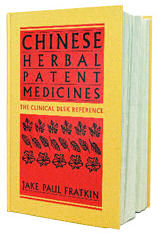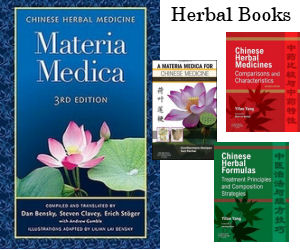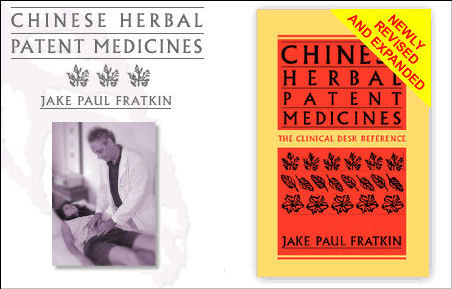Acupuncture & TCM Articles

Articles by Jake Paul Fratkin, OMD, LAc
Jake Fratkin, OMD, LAc, has been in the practice of Oriental medicine since 1978. Following undergraduate and graduate training at the University of Wisconsin in Chinese language and philosophy and pre-medicine, he pursued a seven-year apprenticeship in Japanese and Korean style acupuncture with Dr. Ineon Moon and a two-year apprenticeship in Chinese herbal medicine with Drs. Zhengan Guo and Pak-Leung Lau in Chicago. He also spent a year in Beijing hospitals interning in advanced herbal medicine, specializing in gastrointestinal and respiratory disorders, and pediatrics.  Dr. Fratkin is the author of several books, including Chinese Herbal Patent Medicines: The Clinical Desk Reference, and is the editor-organizer of Wu and Fischer's Practical Therapeutics of Traditional Chinese Medicine. In 1999, he was named the "Acupuncturist of the Year" by the American Association of Oriental Medicine.
Dr. Fratkin is the author of several books, including Chinese Herbal Patent Medicines: The Clinical Desk Reference, and is the editor-organizer of Wu and Fischer's Practical Therapeutics of Traditional Chinese Medicine. In 1999, he was named the "Acupuncturist of the Year" by the American Association of Oriental Medicine.
Chinese Herbal Patent Medicines: The Clinical Desk Reference
Hardback book, 1198 pages. This volume covers 1360 products, including 550 GMP level products and all of California FDB analysis on 505 products. Includes information on endagered animals, heavy metals, and pharmaceuticals. The text is organized into 12 groups, with a total of 109 chapters and includes material by Andrew Ellis, Subhuti Dharmananda, and Richard Ko. Over 80 pages of full-color photos (with English and Chinese cross-reference). Fully indexed.
Treating Menstrual Disorders with Plum Flower Products
In the Classical and Traditional labels, Plum Flower offers five classical formulas for treating common menstrual conditions. We can look at them according to the conditions that are treated.
1. PREMENSTRUAL SYNDROME. The main symptoms of premenstrual Syndrome (PMS) are irritability, breast distension, headache, and lower abdominal swelling. The severity of one´s PMS can be assaged by how many of these symptoms manifest, and for how many days prior to the period. For example, a woman with two or three of these symptoms who has PMS for ten to fourteen days has a more severe case than a woman with one symptom for three days. The cause of three of the symptoms (irritability, breast distension and headache) is due to liver qi stagnation. The fourth, lower abdomen distension, also involves deficiency of kidney qi.
A woman´s body heats up naturally between ovulation and menstruation. If there is any pre-existing stagnation of liver qi, this will get worse with the natural heating of the body, because heat aggravates stagnation. The principal of treatment with PMS formulas is to move liver qi while dispersing liver heat. This approach has a remarkably high clinical efficacy, with success being obtained in one to four months of treatment. Normally, PMS formulas are given from the onset of ovulation until the first day of the period. If periods are irregular, or the onset on ovulation is unknown, they can generally be started about seven days after the period ends. It is not contraindicated to start them right away after the period, but probably less useful then using a post menstrual blood tonic.

There are two Plum Flower formulas available, the second being a variation of the first. FREE & EASY WANDERER TEAPILLS (Xiao Yao San)was first recorded by Chen Shiwen in 1080. In the main, the formula moves liver qi and blood using Bupleurum Chai Hu and Paeonia Bai Shao. Tonification of spleen qi is required in order to reduce the excess of qi in the liver, thus stabilizing the father-child relationship between liver and spleen. This is accomplished with Atractylodes Bai Zhu, Poria Fu Ling, and Glycyrrhiza Gan Cao. Mentha Bo He acts to disperse liver heat outwards to the surface.
FREE & EASY WANDERER PLUS TEAPILLS (Jia Wei Xiao Yao San)is an elaboration of Xiao Yao San recorded by Wen Sheng in 1860. He added two herbs, Gardenia Zhi Zi and Moutan Mu Dan Pi to facilitate reduction of liver heat. In my opinion this is a clinically more useful formula for PMS. Xiao Yao San, however, is similar to Xiao Chai Hu Tang, and can be used for non-gynecological cases of liver stagnation, including chronic hepatitis.
2. MENSTRUAL CRAMPS. Chinese herbal medicine is particularly useful for menstrual cramping (dysmenorrhea). The treatment principle is to activate blood and dispel blood stasis, and many Chinese herbs have been discovered for blood stasis causing menstrual cramping. The underlying condition usually involves liver qi stagnation, and it is not uncommon for women who suffer cramping to also have premenstrual syndrome. Another common factor in creating menstrual cramping is exogenous cold entering the uterus during menses or childbirth. In these cases, herbs or formulas need to be used that dispel cold and warm the uterus. An underlying deficiency of kidney yang can also lead to dysmenorrhea, and needs to be treated with an additional formula to boost kidney yang.
Formulas for menstrual cramps can be taken for week prior to menses, or during the onset of the period only in order to relieve pain and discharge clots. In stubborn case of dysmenorrhea, or in the case of small uterine fibroids, the formulas can be taken throughout the month. Once cramping is over, it is best to discontinue the formulas during menses so as not to aggravate excessive bleeding.
Plum Flower offers four products for menstrual cramping. CALM IN THE SEA OF LIFE TEAPILLS (Tong Jing Wan) is an excellent general formula. Of the ten herbs in the formula, seven are strong blood invigorators, including Prunus Persica Tao Ren, Salvia Dan Shen, Typha Pu Huang, Corydalis Yan Hu Suo, Ligusticum Chuan Xiong and Carthamus Hong Hua. The inclusion of CyperusXiang Fu activates the flow of qi from the liver to the uterus, along the liver channel, while Lindera Wu Yao warms the liver channel and uterus. This formula can also be used for small uterine fibroids.
STASIS IN THE LOWER PALACE TEAPILLS (Shao Fu Zhu Yu Wan) was recorded by Wang Qingren in 1830. Using strong blood invigorators (Typha Pu Huang, Trogopterus Chao Wu Ling Zhi, Commiphora Myrrha Mo Yao ) he also added three warming herbs (Cinnamomum Gui Zhi, Foeniculum Chao Xiao Hui Xiang, and Zingiberis Chao Gan Jiang.). This allows the formula to be useful for stubborn cases aggravated by exogenous cold that has entered the uterus.
TAO HONG SI WU TANG TEAPILLS (Tao Hong Si Wu Tang Wan) is used for menstrual cramping due to blood deficiency. A simple formula, it takes the basic blood building formula FOUR SUBSTANCES FOR WOMEN TEAPILLS (Si Wu Tang Wan) and adds two blood moving herbs, Persica Tao Ren and Carthamus Hong Hua. Although less commonly used then the other formulas mentioned above, it is a useful blood tonic when there are mild episodes of cramping or clots. The formula was recorded by Wu Qian in 1742.
CINNAMON & PORIA TEA PILLS (Gui Zhi Fu Ling Wan) was recorded by Zhong Zhongjing in 220 AD. While warming the uterus with Cinnamomum Gui Zhi, the formula moves blood with Paeonia Chi Shao and Prunus Persica Tao Ren. Besides being used for menstrual cramps, it has also been used following childbirth for retention of the lochia or placenta. The Japanese, in the Kanpo tradition, will also use it for ovarian cyst.
Other gynecological formulas in the Plum Flower line include WARM CYCLE TEAPILLS (Wen Jing Tang Wan) for infertility and amenorrhea, WOMEN´S PRECIOUS TEA PILLS (Ba Zhen Tang Wan) for tonification of qi and blood following the period or childbirth, CHIEN CHIN CHIH TAI WAN (Qian Jin Zhi Dai Wan) for leukorrhea, TWO IMMORTALS TEAPILLS (Er Xian Tang Wan) for menopausal disorder, QI BAO MEI RAN DAN for hair loss, and EIGHT RIGHTEOUS TEA PILLS (Ba Zheng San) for bladder infections.
Obstetrics, Gynecology & Pediatrics in Chinese Medicine Books
Handbook of Obstetrics and Gynecology in Chinese Medicine, Acupuncture in Pregnancy and Childbirthing, Pediatric Acupuncture.
 
|
